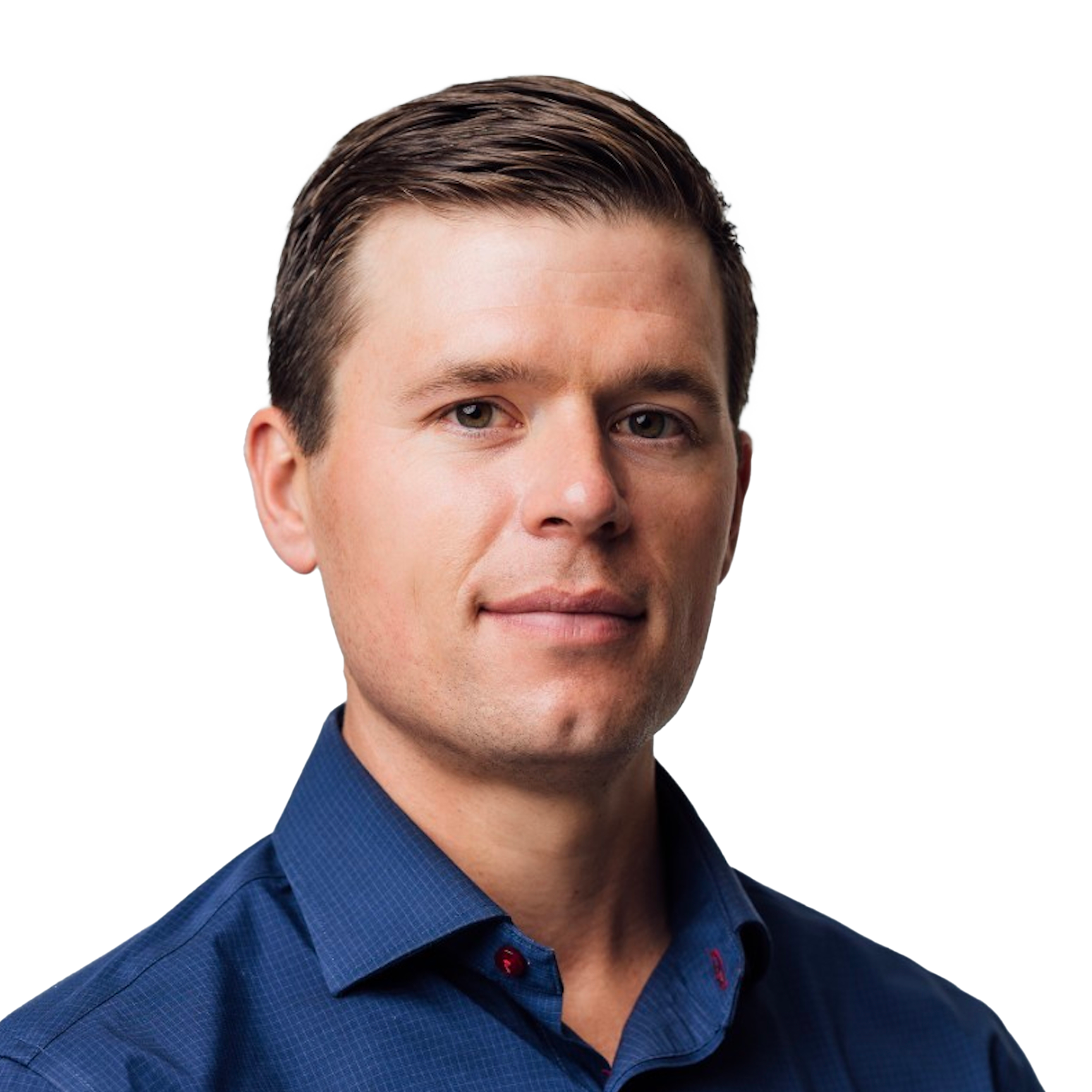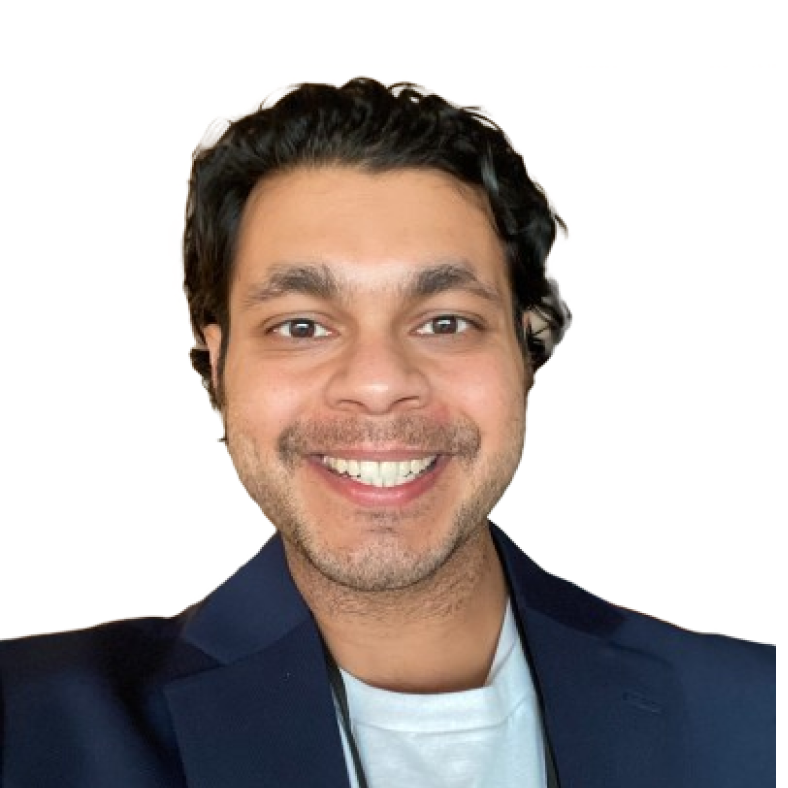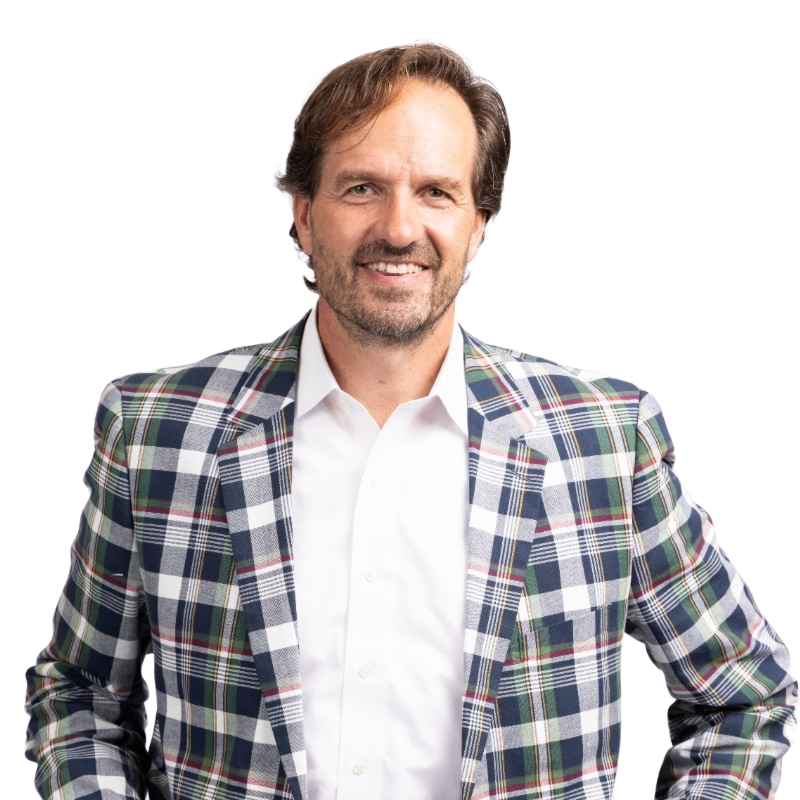

In this episode of Path to Growth, host Tracy Young sits down with Ross Rich, co-founder and CEO of Accord, to explore the real challenges and inspirations behind building a company rooted in helping B2B sales teams reach their potential. Ross opens up about the deep entrepreneurial legacy in his family, sharing how lessons in persistence and hard work from his parents laid the foundation for his own career journey—from a stint in the music industry to leading enterprise sales at Stripe, and ultimately co-founding Accord with his brother.
The conversation dives into what it really takes to create value in sales today, especially in a world flooded with automation and generic outreach. Ross explains how Accord was born out of frustration with inefficient onboarding and broken sales processes, and how he’s working to raise the bar for what sales professionals can achieve when given the right tools and structure. Tracy and Ross also unpack the evolving role of AI in sales and product development, how top performers are differentiating themselves, and why thoughtful, human-centric communication still wins.
Beyond sales tactics, the two discuss the emotional toll and mental stamina required to build a company from scratch. Ross reflects on the unique dynamics of founding a business with his brother, the role his wife plays in grounding him, and the importance of conviction, adaptability, and resilience as a startup CEO. This candid conversation is full of hard-won insights, relatable founder moments, and a deep respect for the craft of selling—and leading—with integrity.
Podcast Transcript
[00:00:00] Ross Rich: I think it is a limiting belief that folks just wanna understand the features and functionality. I think reps don't understand that. Like even C-Suite folks, even VPs, do you want to hear your opinion? 'cause people don't want to. If you want information, you Google it or you ask TBT right? Information is so widely available.
[00:00:26] They want perspective and maybe they don't agree with you. Maybe, hey, cost is the most important, or maybe speed is, or maybe it's something else. It's not a fit, but getting there faster, and again, the respect that you get and it's also more fun.
[00:00:38] Tracy Young: Hi, welcome to Path to Growth. I'm Tracy Young, co-founder and CEO of Tiger Eye.
[00:00:41] Today we are joined by Ross Rich, co-founder and CEO of Accord. Ross, welcome.
[00:00:48] Ross Rich: Thanks for having me. Tracy. Excited to dive in here today.
[00:00:52] Tracy Young: So before we start talking about accord, I wanna go a little bit farther back. Will you tell me about mom and dad and growing up and what you learned from them?
[00:01:03] Ross Rich: Wow, we're getting, getting very personal here.
[00:01:05] Uh yeah, definitely. Um, if people ask me, you know, was it a crazy idea to start a chord? Start your own company? Not just my parents, but both grandparents on both sides. Uh, were entrepreneurs. So yeah, moving from Eastern and Central Europe back in the early 19 hundreds, both of them came to Toronto and New York respectively and built their own companies.
[00:01:28] And then, um, you know, both my parents had been very entrepreneurial, so yeah, definitely learned a lot. And I think it's more of just the, like, I wouldn't say expectation is probably the wrong word, but that it's like not a crazy thing to go out and. Try something. So I feel like my brother's also one of our co-founders here at Accord didn't feel like it was a wild idea to, to leave our jobs.
[00:01:48] I striping Google to give founding accord a shot.
[00:01:52] Tracy Young: So what did you learn from them other than them being really supportive of both your entrepreneurial journey and I'm sure they're so proud. So I've got three sons and the idea of them getting older and starting a company together is so outrageously sweet to me because they're at the age, they're like six and four, and.
[00:02:11] And, uh, a four month old, but they're, they're like fist fighting. The older kids are fist fighting all the time, so to imagine them being older and working together is like magical to me. So tell me about what you learned from your mom and dad.
[00:02:25] Ross Rich: Yeah. Very specifically, I'd say hard work and persistence come top of mind.
[00:02:32] So my mom was originally really passionate about design. So she got into FIT in New York, graduated I think a year and a half early from her small town in Batavia, in upstate New York. Was very hard worker. Struggled I think, you know, with some, some things around school, but just outworked everyone and was able to, you know, despite not coming naturally, actually graduate early and get to her kind of dream program.
[00:02:56] Ended up hating it. Just like very different. Moving from small town to New York to the big city and. I think was passionate about other parts of design that weren't necessarily related to school. Ended up going to accounting at Syracuse and again, worked super hard and got an amazing job after. And I think something that I, I've definitely taken from her is, you know, both follow your passion.
[00:03:15] So I actually started my career in the music industry in New York, so very similar path and then ended up, you know, not liking it and, and to San Francisco and, and falling in love with technology and B2B sales. But that idea of like. If you just kind of stay persistent, consistent follow what you're passionate about, but also just really work hard, I think leads to good things.
[00:03:33] So I think both of them have, have very much taught me, you know, the power of just kind of putting in the hours and, and staying consistent and and persistent.
[00:03:44] Tracy Young: That's wonderful. Thanks for sharing that. So your, um, we spent some time in the music industry and I have so many questions there, but we're gonna focus on Accord.
[00:03:53] You were a B2B sales leader and you spent your time doing that in tech. Tell me about the moment where you decided to like quit your high paying sales leader job and to become a starving startup founder.
[00:04:13] Ross Rich: I think it was probably. 80% pull into doing that and a 20% push. The push being, you know, was at at Stripe for about five years.
[00:04:24] I absolutely loved it. Going from literally no CRM, not knowing what to say to customers, what is even the idea of a demo at Stripe to being part of a 500 plus global go to market and sales machine. I think at the beginning it was really exciting 'cause it's like how do you pitch this product?
[00:04:42] Who do we talk to? How do we get a CRM and actually handle lever? Like literally all of the zero to one problems. I really, really enjoyed kind of the first principles think of like how do you solve this? Especially not coming from sales and we didn't take a lot of like the classic playbooks was a lot of like figure it out and I really, really enjoyed that.
[00:04:58] And doing it from the field, right? Like doing that, being on the front lines with other sellers and with our customers. It got to a point after, you know, selling the first of a kind deals and, you know, working on all these exciting partnerships where it kind of felt, you know, monotonous in a way. It's like, Hey, like I'm gonna go do another thing.
[00:05:13] And some people love that scale up. It was like, how do we do this from 20 to 200 and 200 to 2000? It was like, it felt like a lot of those zero to one problems weren't around anymore. And I was kind of looking at like, what's my path here? Like doing my boss's job, my boss's job, like.
[00:05:28] That is less of what I was passionate about. And the thing that I got really excited about was working with our VP of sales and head of rev ops and enablement around kinda building process and repeatability around what we had figured out from that zero to one. So it's like how do we then help other people understand when we have a new hire, class of 20 AEs, how to do what we've learned.
[00:05:48] And it felt like everyone that came in after me had to also figure stuff out, which to me was mind boggling. 'cause I'm like. It makes no sense. We've already figured this stuff out. Why does everyone else have to figure out how to sell to these different types of deals? So that's where I got passionate about the idea behind a accord.
[00:06:00] It was less of starting a business. It was more about just getting really obsessed around this problem that seemed honestly very silly of like, Hey, you've figured out how to sell these things. We have. Billions of dollars of valuation and hundreds of millions of dollars of revenue. Like shouldn't a new person be able to join and learn from what other people have learned already?
[00:06:16] And it felt like starting from scratch because we just would update Salesforce fields or stage names or have these internal playbooks and it's like, oh, here's how to sell. It's like, that's not how sales works. So that's kind of led me down the, the path of, of founding accord.
[00:06:29] Tracy Young: Yeah, it's, it's really unbelievable having been able to see a lot of fails ramp time and it's like, wow.
[00:06:38] Even at these really big companies, we're talking about like nine months before their rep they're expecting their rep to bring in any revenue. It's like this really takes nine months to train them up. But tell us about Accord and the problems you guys solve.
[00:06:52] Ross Rich: Yeah, I mean, that's such a great point is like, and I think part of it may be 'cause I didn't come from sales and I felt like, hey, these people are professionals of their craft.
[00:07:01] They should be able to come in and learn a new industry and be able to apply their training. Like kind of this perspective of like, they should be better than me. Like low ego. Like, hey, I'm not that like great and unique. Like if these people are doing this thing before they should be able to come in.
[00:07:14] That just wasn't the case. So yeah, cord's all about how do you not just create repeatable, consistent, go-to-market motions, but really value selling. Like that's the thing that I also really got passionate about was like being that consultative salesperson. How do you become a master of your domained market?
[00:07:30] And there's so much information out there for buyers is like. Despite the role dispar, uh, like kind of difference between like an AE and selling to someone in the C-suite or vp. I always really enjoyed the fact that I could confidently come in and know more about this tiny domain than them, right? Like at Strip we pitched to a lot of CTOs and chief product officers.
[00:07:49] It was like, Hey, you are so much further in your career. You know all about this thing. You're at this amazing company. But when it comes to payment process and when it comes to this thing, I've worked with hundreds of com and we know this, and that's what I, I really, really enjoy. And I think that's why a lot of sellers enjoy their job of, they can add a lot of value from that.
[00:08:06] And how do you build that into the culture? Of your sales organization. I think typically people expect the top performers to do that, but not everyone. I was like, that should just be the expectation is we can all do this and how do you think about operationalizing that across your go-to-market team?
[00:08:22] So that's kind of the problem space that we get really excited about and kind of surprised that. The alternatives again are these ba massive Salesforce projects or, you know, hiring in a trainer or one of these big consulting shops. You get everyone stoked for the SKO or, you know, some training and, you know, launching some new methodology and then you all just go back to the status quo a couple quarters later.
[00:08:44] So, just the expectation from sellers, I feel like is sometimes too low and that we should be shooting for kinda a higher bar for execution.
[00:08:54] Tracy Young: Two things you said really resonate with me. One, with value selling. Having been in sales for a long time, I think all CEOs and founders are in sales, regardless of what industry you're in.
[00:09:04] 'cause you're always selling your vision and your mission and your product and maybe even your company. I have found that, and you think myself included, you know, as a purchaser of products, I don't wanna be sold to by a sales person. I wanna be sold to you by a trusted business partner. Yes. Like an expert who's gonna help me bring some rhyme and reason and like clarity into this chaos of running my business.
[00:09:30] Right. So that makes a lot of sense to me. And then also, why is it that every single big company thinks that they need to bring on an outside trainer? Like why is that a good idea? This group. Okay, yes, I'm sure they've got good toolkits, but they have never sold their thing before. Meanwhile, let's like, let's hire them for like several hundred thousand dollars and have them train our sales team.
[00:09:56] That has never made sense to me, and I've sat in these, these like presentations and it's like, wow, why did we waste a boatload of money on this?
[00:10:05] Ross Rich: It's a good question, and I honestly do think that there's space for it, but that it needs to be a mixture of. Those best practices translated to the company, but then also reinforced.
[00:10:17] And that's I think, the biggest missing piece. Like if you look at the cost spent at one of these big companies, maybe they'll spend 500 k plus on one of these big trainers, consultancies, whatever. Yes, it's good to reinforced as best practices. And yes, if you have a big sales team, you can kind of do the math of, you know, how much is it worth for being able to sell bigger deals and higher ACVs and ramp time and all that good stuff.
[00:10:40] Then yes, you need the internal teams to be able to translate that to what are those great discovery questions for us? What is the kind of RO math, ROI math for us? How do we do all this stuff and then it's gotta continue from there. And I, you know, I would ballpark probably a 90%, 10% split of money and investment spent on that big moment, that big SKO, that big trainer coming in and the 10% on the reinforcement because it's not sexy.
[00:11:05] Right. Doing the big moment, having people come to the SKO, getting everyone stoked. Is exciting and gets budget and the day-to-day reinforcement, how we're doing deal reviews, how we're asking questions, how we're translating this to the customer facing meetings like doesn't get the excitement and investment and time from the C-suite and from the VPs.
[00:11:25] It's really misunderstood what's like on the ground and I think this problem only gets bigger the more levels there are. The level between AE and you know, VP, CRO, who's making these decisions at even a mid-market company could be four different levels, right? Ae manager, director, senior director, vp, and I think they lose out on what's truly happening.
[00:11:45] And what are those conversations like with your customers on the field? And they are very different than, I think the best practice examples. They think, you know, that we, that we champion at the kind of training level.
[00:11:56] Tracy Young: So what lessons from your sales days do you bring. And carry with you as founder and CEO.
[00:12:05] Ross Rich: I think kind of what you mentioned around how customers want to be treated and how they wanna work with you, I think it is a limiting belief that folks just wanna understand the features and functionality. I think reps don't understand that, like even C-Suite folks, even VPs, do want to hear your opinion.
[00:12:23] And I think again, it comes to that huge separation between how you think about engaging with your VP or other VPs internally and when you're external, that confidence that you should have of I do understand the status quo. I do understand the alternatives. I do understand the space so much more than anyone else could and being an expert in your domain and be able to offer opinions, and so that's one of the things that I take forward to both our team, but also the product.
[00:12:49] Like how can we give confidence to. AEs, CSMs se, that are interfacing with customers and being able to drive a more prescriptive kind of guided motion. 'cause people don't want to, if you want information, you Google it, or you ask chatt PT, right? Information is so widely available. They want perspective and maybe they don't agree with you.
[00:13:07] Maybe, hey, cost is the most important there. Maybe speed is, or maybe it's something else. It's not a fit. But getting there faster. And again, the respect that you get. And it's also more fun. Like I find it more fun to engage with people when you're having a thoughtful conversation instead of just going through the laundry list of.
[00:13:21] Features and functionality. So I think there's a lot of benefits and that's kind of what we're, what we're trying to champion is those kind of aha moments for sellers and teams around how, how they should be going to market.
[00:13:32] Tracy Young: Mm-hmm. I was reading, um, this study that was published by Duke and it talked about people using AI for their work, but then hiding it from their peers because there's a stigma and they don't want their peers or bosses know that they're using ai.
[00:13:51] I was reminded by that because you just recently said, um, you know, just, just look for and chat GBT. Just get your answer there. Yeah. So how do you think of, oh, let's talk about it. Like what do you think about AI and is there areas of your business where you are like scaling back and investing more for in ai?
[00:14:12] Ross Rich: Well, maybe just to kind of carry that thread, like you mentioned, I think that's a perfect example of like where AI comes in and where the human comes in. If you want to get spun up on your customer, you, you know, either your own space, if you're a newer seller and the go-to-market team of your own company or to really understand your client, to do that research really quickly, to pull the tech, that stuff takes time.
[00:14:35] That could save you, you know, maybe three hours of initial research before you know, a C-suite call that you worked really hard to get. That's not how you're gonna engage with them though, right? You're not gonna just, you know you're gonna ingest that information, maybe write like a nice pre-read or overview about it and show that they, you understand their space, but that's not the customer facing thing.
[00:14:52] I think you need to, again, ingest that and apply your point of view. So again, I think it's a really great way of bringing in a lot more information really effectively and summarizing it. I don't think it's how I'd probably want my team to show up to a million dollar potential deal and just. Spit out all that information, I want them to internalize it and say, oh, based on what I learned about your business in, which probably took 20 minutes instead of two or three hours, this is how we think we can work together and to develop a stronger point of view and more informed point of view.
[00:15:22] So I think that kind of applies how we think about AI both internally and with our product. So like, for example, our engineering team, you know, started using, uh, GitHub copilot and then ended up trying out Cursor and Windsurf. They ended up going with Windsurf. They're able to not outsource kind of outsource some of the basics for more of having a product mind and perspective.
[00:15:44] So it's not like they're outsourcing and AI's just doing it. It's saving them time on some of the really kind of groundwork stuff to be able to then interpret and use the perspective about the customer and the workflows and the things that we want to achieve. With their vehicle, which is code similar to the research example with, you know, internalizing that and, and having our perspective for customers.
[00:16:06] So I think it can make really good people great or excellent. Like I think about, you know, the limiting factor for your top AEs. Maybe being time, maybe they can only work two enterprise deals and close two, you know, million dollar deal accounts. What if that could be a third or fourth? For them. It's not necessarily, they're not like, oh, I hope I get luck.
[00:16:25] It's like they're great at it. If they could save time on some of these things, maybe they could be even more efficient. I don't think that helps someone who doesn't have the right point of view and doesn't know how to work with customers be more effective. If you ever a 15, 20% win rate, well it's probably not gonna help increase that and you're still not gonna be great.
[00:16:40] Um, same thing on the engineering side. Probably points out people that are making worse product decisions because they're building in more bugs and they're making worse product decisions that are compounding. So they compound some of the bad work. I think it accelerates some of the great work.
[00:16:56] Tracy Young: How do you see B2B deal execution evolving over the next 10 years?
[00:17:02] Ross Rich: That's a big question. Again, I think it ties back to what we were just talking about in terms of the, you know, with the tools that we have in, in related to AI is I think kind of what we saw with, I think some of this like mass outbound email type stuff with outreach and others were like, Hey, it became.
[00:17:19] So easy to do that. It kind of got commoditized and then now like ruined the inbox. I think the same kind of thing, if you have all these agents and automations going on you need to elevate and I think actually this consultative value selling that, you know, a fraction of of people and teams are able to execute on that.
[00:17:38] The bar goes up and those are the teams that are gonna do even better. I actually think the job of these great sales leaders and reps are more valued. Over time, and I think it kind of breaks away from the rest. Similar to engineering, right? Hey, if everyone can kind of code like a junior coder, like then the product decisions you're making and integration decisions and connectivity, those things are even more valued.
[00:17:58] So I think the top of the top elevates, and then it's like kind of who's gonna elevate and figure that out and who's not. And so if that's kind of my, my read on it. 10 years is very far out and maybe that's my guess for like the next two or three years. Yeah. But I think people want, again. Decisions matter even more in that world.
[00:18:14] And I think, again, people want that consultative, I think they care more about peers too. I think it's more of this like advisory type role in decisions. Even more so. I think people value their peers feedback more. So you need to have a relationship across an ecosystem, not just their peers, but other players in the space.
[00:18:31] Like that's where I think the great sellers and and go-to-market teams are gonna be focused.
[00:18:36] Tracy Young: Yeah. When we go out and talk about our product and what we solve for our customers. There is a little bit of fear 'cause we, you know, we automate a lot, a big chunk of what they do. You're just not munging numbers on spreadsheets anymore.
[00:18:49] You have AI calculate stuff for you and you can have ize ai, like create all your graphs for you instantaneously without work from a data team or a rev ops team. And what we remind them is there's. A big chunk of their job that is literally talking with other people and getting buy-in and like coming up with tactics and strategy and then actual execution.
[00:19:12] Yeah. AI can never do any of that. And so the best people, so that differentiation
[00:19:16] Ross Rich: goes up ex. Exactly. Agree. So the things that you need to be uniquely good at become more important.
[00:19:21] Tracy Young: Yep.
[00:19:22] Ross Rich: Exactly. Yep. Yeah.
[00:19:23] Tracy Young: And then I also agree that, man, all of the like, outreach and the, like, my the ruining of the inbox.
[00:19:32] It's so true. I was just thinking like, man, every morning I go into my Gmail and it's, I literally sit there for about five minutes clicking through unsubscribing to things I've never signed up for and then just deleting outbound outreach. Of cold emails that weren't written by humans. And then when I do get like a thoughtful email, or maybe it was written by ai, but someone like Trump engineered the heck out of it, right?
[00:19:57] And it looked like a really good email that I, I was like really pulled into like that, that really sets things apart for me.
[00:20:04] Ross Rich: You, it probably stood out more. Because you've got all those bad ones and that's what I'm trying to tell people is like, mm-hmm. I think it's getting easier in a way. If you really do a great job, someone to your example of like, Hey, the great people that are using AI tools in your space are gonna be doing exponentially more work than their peers.
[00:20:24] Again, it's more of the like, taste and and thoughtfulness part comes in, so like the best can get better and get more work done. The rest, it's gonna, it's kind of gonna be even harder to be able to stand out and, and really be worth the difference between the delta, between the agent and you if you're not getting better at your craft.
[00:20:45] Tracy Young: You know how your handwriting just becomes total shit when you don't write for a long, long time. And you know, you see this during like Christmas time, it's like, wow, why is this so hard to just write a Christmas card? And it's like, oh right. 'cause I like type most of the time I type my notes now and I think the same thing's gonna happen with writing.
[00:21:03] Like so many people I see are just sending the AI generated writing that they're gonna, that muscle's gonna atrophy and they're not gonna be able to write anymore, which is kind of funny.
[00:21:13] Ross Rich: That is a really, really good point. And it's funny because I actually think ai, so many people haven't been writing for so long.
[00:21:21] It's kind of better than the average, but then it's so much worse than when people are excellent at it and how persuasive and how thoughtful it can come if it's from like a really, really. Craft full writer
[00:21:34] Tracy Young: a beautiful piece of writing. Yeah, exactly.
[00:21:37] Ross Rich: It's hard, it, persuasive, it's whatever. And, and, but I do think, because I don't know, the bar for writing whatever it is, like is, is incredibly low.
[00:21:44] I see. In the business world, even from like some senior people, no, I'm not worried about grammar, I'm not worried about any of that stuff, but just like the, the quality of some paragraphs that I get, I'm like, this is shockingly not great. We're all that kind of stuff. So I'm like, I think it actually maybe helps some of the, you know, the average, but.
[00:22:00] Like, you're not gonna be able to ever take that away. And that's where I, you know, I, I feel like some people are minimizing, again, those kind of like the really excellent things to stand out. I don't think, and maybe, I guess there are, like, I think that's what makes us human in some ways is that like, like EQ and understanding and contextual choices that you're never gonna have.
[00:22:22] Maybe we get worse as a society around some things because we just rely on it more and more.
[00:22:27] Tracy Young: Yeah. But as you said, the the best is still gonna be there. You know what makes, there's like a conveyor belt of music happening that's written by ai, but it's like, that's not really, I mean, it's impressive, but it's not stuff I listen to.
[00:22:40] 'cause the music I listen to has a human perspective to it.
[00:22:44] Ross Rich: And sometimes purposely worse in a way is better. Like I, you know, I used to be doing in the music world is like sometimes having that, you know, lo-fi static sometimes. Why do people like to listen to vinyl? It's because it feels differently. And can you get that feeling?
[00:22:59] It's again, such a human thing. I don't know if you know again, 'cause it'll change and then the average changes and everyone gets used to this and then you're like, purposefully not doing that. And they think only the best of the best to really understand that dimension.
[00:23:13] Tracy Young: So as CEO, what are the most important responsibilities you have to your team in the company?
[00:23:21] Ross Rich: Uh, everything. Uh, I'll, now, I'll have to prioritize, but I feel, definitely feel responsible for everything. Like, if something doesn't happen, it's not because of the person that I asked that didn't do it right, it was probably 'cause I wasn't explicit enough or, you know, it's, I, I, I feel that responsibility for any outcome or input.
[00:23:40] But if I were a stack rank, like if I only did certain things, keeping the lights on, you know, I forget, you know, whatever the grade, you know, YC or founder expressions around, you know, like just don't run outta money. Don't run outta money. Don't run outta money. Probably the top three things, you could solve a lot of other things with time.
[00:23:57] I think it's really direction I think you like, right? They say you can hire great people and get outta the way, but like without direction, you can't just hire great people like you. They look at you and I feel like when I look at companies. That might have like a non founder, CEO sometimes, or kind of, you know, like wandering around.
[00:24:14] It's typically because they're not driving in a place and like you can be really successful going pretty hard into an area that might not be right, but doing it well. I think the challenges when a lot of people are kind of wandering in, like you might already mentioned. It's harder for people to make decisions than ever.
[00:24:30] 'cause there's so much concern and social pressure By making the wrong decision, it feels like people are so worried about making the wrong decision, they're making no decisions, and for a really long time. So I think my responsibility is having conviction and making decisions and providing that direction.
[00:24:45] Learning from that, and then shifting quickly. And that's, I think, the superpower of a startup is the speed and not getting too tied up of, you know. I think we're fine if we make the wrong decision, as long as we're conscious of it and learn from that. I think the biggest concern is we don't have that conviction and confidence and don't end up making decisions, so that's probably where I would don't run into money and make sure we're going in a path, learning from it and changing it.
[00:25:08] If I could do those two things, probably be all right.
[00:25:11] Tracy Young: I think that's a really good summarization of your role as CEO. So how has your definition of success changed? Is it still, is it still, I mean, obviously the financial targets are important.
[00:25:26] Ross Rich: Yeah. Honestly, I think the thing that drove me was. Again, more of that experience that the visceral experience that I had at strike.
[00:25:36] Getting really passionate about sales, getting really passionate about doing the right craft with me and my team, trying to translate that to everyone and just not working and being like, we'll be successful if we kind of build this new way of, for the people that were the Ross of the world and my team, the VP of sales enablement ops of like instead of changing fields in Salesforce, instead of trying to hire a trainer instead of doing these things, there's a new way, a better way.
[00:26:01] To drive this value-based go-to market process. Like, hey, there's a more field friendly way, there's a more customer friendly way. There's a more opposite, like internal way of we expect this out of our team. We want our people to be advisors. We want our people to have point to run a process. Like that's really at the heart of why I'm still working on this instead of, you know, anything else in the last five or so years.
[00:26:23] So success to me is that existing, whether it's, you know, people ask me, oh, what's the goal? IPO acquisition, this thing, it's like. The market gets to decide that. I think if I learned anything through this founder experience in the last turbulent five years in market post COVID and everything that's happened is you only have so much control.
[00:26:42] The market has so much more control and thinking that you do is just like probably not the right way of running your business and understanding what you can control and working within there. And so, yeah, if, you know, if it makes. Sense in five years and, and the market's big enough and we get to, you know, whatever, 200 mil plus whatever the milestone is to go public at them.
[00:27:00] That probably makes the most sense. If it's, there's adjacent companies and products doing similar things and there's a huge push in the market to consolidate it's probably not doing the opposite of that at a long enough time, then we run outta money, et cetera, et cetera. So it's kind of, I feel like it's a really bad non-answer.
[00:27:16] It's kinda like. Doing the right thing in the basis of the market. But if it was like saying one thing, well that might not be the right thing, that might not be the organic thing and the right thing to do for, for the company and for the product and for the mission of kind of upleveling the expectation for B2B sales to happen could be some other path.
[00:27:34] So
[00:27:35] Tracy Young: what surprised you the most about founding your own company and running it?
[00:27:39] Ross Rich: How hard it is. It's true. It's, you know, even as second time founder, it's surprising how hard it is. But let's talk about like, yeah. Describe it to people who don't do this or who are thinking about starting a company. Yeah.
[00:27:54] Tracy Young: Why it's hard.
[00:27:56] Ross Rich: Yeah. There's a lot of ways that I've tried to like articulate this. One way that I think does a decent job is. So again, if you're a hard worker, right, you're probably the type of person to start a company. Just to compare it to being at a great company, maybe early stage, and it growing and feeling like you experienced what it was like to be a founder.
[00:28:15] You can't compare what it feels like when you have some sort of product market fit or have some sort of momentum, and you're not just starting from nothing. The difference of energy that goes into getting something started isn't the difference between like. Pushing a ball you know, a rock on a, on a flat surface or even slightly uphill, and then it going downhill.
[00:28:38] It's like fully vertical. Like you don't understand. I think like when I compare outta the hours that I worked, let's say a stripe compared to at a court. I can't work the same hours. I can't work as many hours that I work, work on a accord because the pressure, the stress, like how much harder it is to spend that hour of thinking and changing context and having to be aware of so many different variables.
[00:28:58] When you don't get something started and moving in a certain direction, you have to think so much more and there's so much more pressure. Whereas again, like I could go through a 10 hour day, do all this stuff at, win these deals, do these things, blah, blah, blah. Like, oh, I, I, I know what I put in and I know what I got out at the beginning of a startup, you might not be getting out anything.
[00:29:17] So that motivation, that energy that goes into it, that's like the best way I can poorly articulate. This is the things you're getting back isn't comparable to being at a company that has some semblance of a product and product market fit and all these things. 'cause you're worrying constantly.
[00:29:30] You don't know what you need to work on. Especially if it's a new product, new vertical, new, all this kind of stuff. You're kind of wandering and testing a million things out and then like, oh, this thing went well let's adjust here. Oh, this thing then well, blah, blah, blah. So that, I kind of think of it from like the energy level, why it's so hard, because you're not necessarily getting as much back in terms of that positive feedback from the market when you're still, you don't know what's working, so you feel like you kind of need to constantly worry and think about all these things because you might be.
[00:30:00] The next call, the next idea might be like the thing that makes it work. Uh, and you don't know what that's gonna be, so you feel like you kinda need to do everything all the time. Curious how that relates to, to your two experiences, uh, starting companies? Tracy
[00:30:14] Tracy Young: There's this wonderful Winston Churchill quilt and it goes when you find yourself in hell, keep walking.
[00:30:23] And I think it's such a wonderful summary of founding a company because. You have no choice. You just keep going because the moment you stop is the moment your thing ends. It doesn't matter where you're at, even if you're in hell, you just keep going.
[00:30:41] Ross Rich: And it feels so different on the athlete, right?
[00:30:43] Like, you see the things, I see, the things that I post as you know, you wanna share things when it's good and like get that excitement and all that kind of stuff. You don't see the, the really, really, really challenging days where you feel like nothing's happening. You feel like you've been working on this for all that kind of stuff.
[00:30:54] And then you look back and you're like, oh wow, we're here now. And like, I couldn't imagine a year ago being here. But then the days in between or the hours of the nights, like it doesn't feel like that whatsoever.
[00:31:05] Tracy Young: Yeah. And those are the moments. It's really important to look up once in a while and see how far you've come.
[00:31:10] Even if it's just a quarter, like look where we're at three months ago. It's not too shabby.
[00:31:15] Ross Rich: Yeah.
[00:31:15] Tracy Young: We are a family founding team. Also, I'm married to my co-founder. Curious, I'm sure. And your brother fight and it's so funny to, to found a company with with a family member because the conversations are different than the rest of the team.
[00:31:29] You can actually be rude to each other during off work
[00:31:33] Ross Rich: hours. Yeah. Which I think is a good and a bad thing. Yeah. You can be too familiar.
[00:31:37] Tracy Young: Is there anything you can
[00:31:39] Ross Rich: share here? I think it was one of the best of the worst things early on. I think one of the biggest challenges is that you don't have a big enough business to be able to work on your own staff and there's too much overlap.
[00:31:48] I think for founders in general, there should be very clear separation of ownership and decision making. And someone needs to be the, like the classic YC question, I love this when they do the interview, who's the boss? Someone needs to make the decision and yes, the, you know, the specific part of the business, whatever, but someone also needs to make a decision when it's overlapping in a bunch of stuff.
[00:32:09] I think that's so, so important and I think what's really challenging. With my brother and I. 'cause we have a very dynamic relationship and those things never come up, right? You always consider, oh, like you decide this time, this thing. Like it doesn't, with friendships and with family it's not like that.
[00:32:23] But in business it's, so I think that was one of the most challenging pieces. I think the best pieces, most companies failed because co-founder drama, especially early on when it's so hard and you're the example you just gave around, it's like one or through hell and you know, just not giving up.
[00:32:37] And I think the part about not giving up with each other. And having that mutual commitment to a family member is very different than someone that you might have met recently or even worked with for a bit. And you don't have that commitment and integrity to, so I think that is, that probably helped us figure out and, and continue that, uh, that perseverance.
[00:32:59] Tracy Young: I also love that you obviously cut your teeth at Stripe and there's a shining example of brothers who are running a company very successfully together. I.
[00:33:09] Ross Rich: Yeah, no. Um, I think a good example too of like and you get bigger and then you get to own different parts of it. I think that's way healthier and easier.
[00:33:19] Every year it gets easier and easier because it's like this thing I'm working on year, but like at the beginning it's so, and I didn't work there when it was like year one. Like I can't imagine brothers and like earlier in life, right? Like you learn lessons. Yeah, yeah. How to work with other people, through other jobs, like.
[00:33:33] We were, you know, in our late twenties, they were like in their late teens. So I can only imagine argument that they had beat at that stage of life and, you know, overlapping on so many key decisions they probably both felt super strongly about.
[00:33:47] Tracy Young: It's so funny, my kids are at that age where I can imagine where they, you know, like as a parent, imagine where they're gonna be in five years or 10 years.
[00:33:54] It's like, yeah, there's still gonna be. Fist fighting, you know, they're still gonna be wrestling with each other. And I wonder if the Carlson brothers ever like, argue about work stuff and with each other
[00:34:05] Ross Rich: that changes. I mean, yeah, Ryan and I used to get into it with each other and he was, I mean, he was like six two at like age 13.
[00:34:11] He was just like a freak of nature really early. And I was like, you know, normal size for my age. So that wasn't as fun. But, uh, but um, that people grow up and cha no one cha I don't think people really change, but you mature, you know, it shows up differently.
[00:34:25] Tracy Young: Yeah. Okay. What's your advice for other founders starting out
[00:34:32] Ross Rich: if you're doing it?
[00:34:34] I think for a particular outcome, I don't think it's worth it. It's, for example, like there's a lot of, there's a lot easier ways to make a lot of money with a certain likelihood. There's a lot easier things to do, I think, to feel fulfilled, to do all that stuff. If you feel like it's something you need to do, that's probably the only reason to do it.
[00:34:50] Like looking back, it was way harder than I thought it would be. I think I'm one of those people that eventually even, you know, told me that like I'd just do it and I'm glad I did. But I see a lot of people that give up in a year into, or feel like trapped by it and don't get a lot of fulfillment from it.
[00:35:08] I think make sure that you're doing it. Long story short, I think make sure you're doing it for the right reasons and like you feel like you need to, because again, like there's a lot of trade offs in life that you make like. Health wise, you know, mental health wise, physically, like it's just so time.
[00:35:23] It's if you really want to go for it, it be successful and ask people to help you and people will be willing to help you. So I just think, you know, making sure you're doing it for the right reasons, high integrity, that you're passionate about the space and not just, you know, I think there's a lot of entrepreneurs out there that end up having like a very bad time and, uh, experience trying to start a company and realizing it's way harder and then they have to shut it down.
[00:35:43] And that's probably not a lot of fun. So my advice would make sure it's gonna be harder than you think. It's gonna take more time, it's gonna take more energy, it's gonna take more trade offs in life with friends and other things like that. But there's nothing like the feeling of building something and being proud of it and you know of, again, the impact of why you went out to do in the first place.
[00:36:04] So
[00:36:06] Tracy Young: I agree with that. Let's close with this question. Tell us about one person who's helped you become the leader you are.
[00:36:15] Ross Rich: Wow, that's a big question. There's probably a lot of people, I feel bad almost, you know, saying one. 'cause there's so many people that have been so helpful and impactful to the journey at different, different stages, right?
[00:36:27] Like, I'm sure when you think back to, you know, your, your last company building, like, you know, every six months, there's probably someone who is like the person that helped you get to the next stage. Right now that's probably my wife. Like having, like I started a company we weren't even dating and now we're married.
[00:36:43] Like having someone in your life that's with you that can support you and really build that like partnership, I think is so, so important. I probably couldn't be doing and have the empathy and space for other people on our team and kind and all that kind of stuff without her. So I would say, uh, yeah, I've learned a lot about myself and able to do what I do 'cause of her.
[00:37:04] Tracy Young: As someone else is white. I'm gonna say that is an excellent answer, Ross. Same for me. I feel like my husband, who's also my co-founder of both my companies, he's just been my biggest supporter, and it's really, really helpful in those hard moments to have someone who is so on your team and just believes in you no matter what.
[00:37:26] It doesn't matter. In those low, worst, worst moments, they still believe in me and it's some. It makes it easier to pick yourself up and just keep going.
[00:37:35] Ross Rich: Completely. Yeah. I'm glad you found that
[00:37:36] Tracy Young: too.
[00:37:38] Ross Rich: Very important.
[00:37:40] Tracy Young: I could talk to you for another two hours. It's been really fun. We should do this again.
[00:37:44] Thank you so much for sharing everything about yourself and your journey.
[00:37:49] Ross Rich: No, it's, it's fun. I'm usually on the other side asking questions, but it's, it's great. I, I love these opportunities to reflect, right. You know, like being forced to really think about this and, and, and share with someone who's, you know, also has been through it.
[00:38:00] So, and that was a lot of fun. Good to reflect and hopefully I definitely learned a lot out of thinking about it. Hopefully other people out there that'll listening, you know, also were, we're able to learn.
[00:38:10] Tracy Young: Thank you.

.png)













